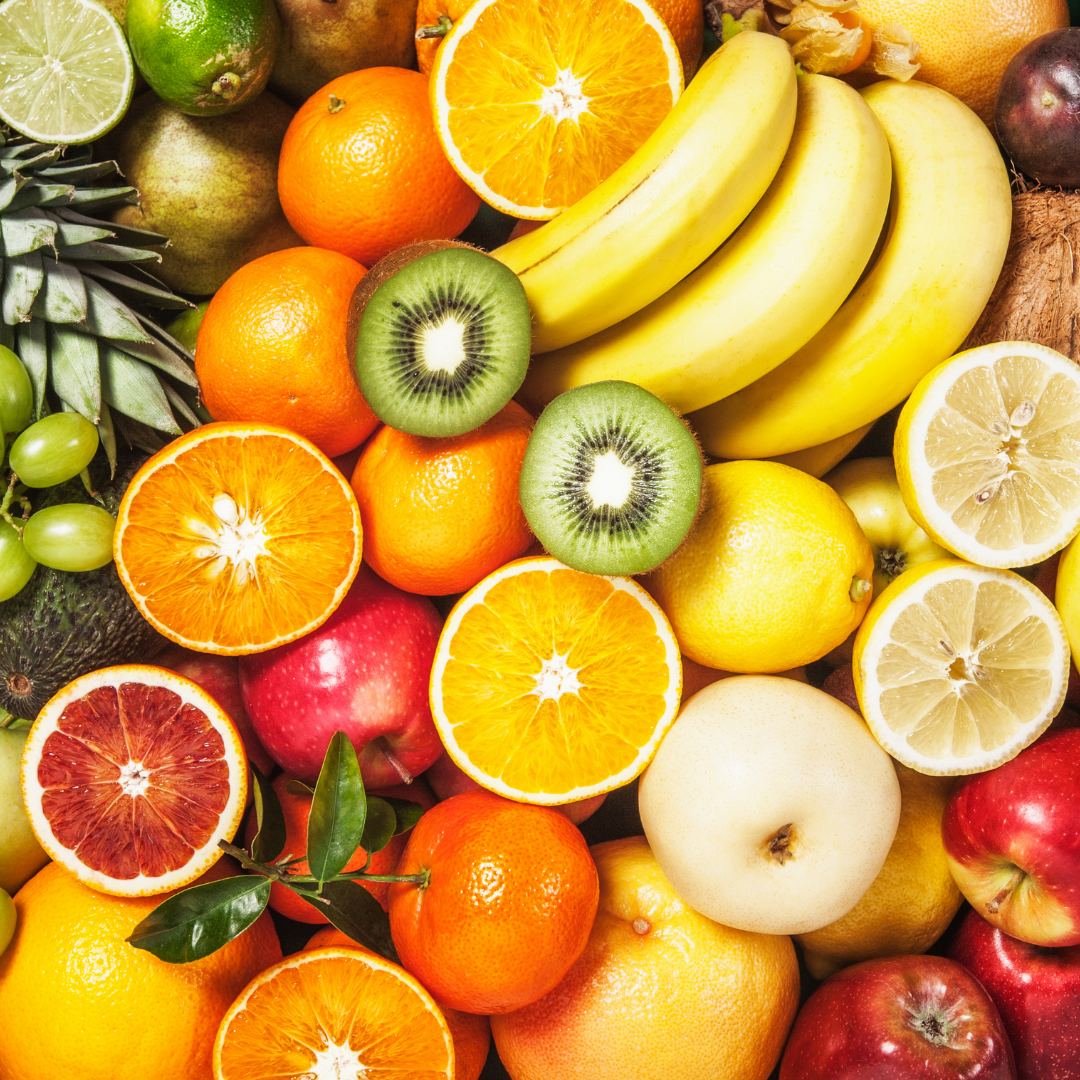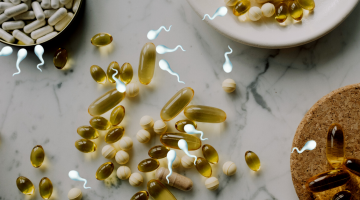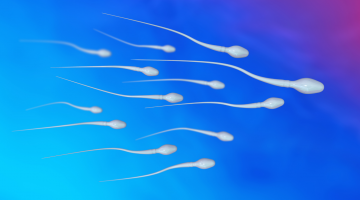Top 10 Fruits to Increase Sperm Count and Motility
We discuss various nutrients and dietary supplements in this article that may or may not be helpful. If you purchase recommended products, services, or treatments, it may benefit CNY Fertility financially. Read more about our financial relationships here. The supplements discussed in this article are not intended to treat, cure, or prevent any disease. If you are pregnant, take any medications, or have been diagnosed with a medical condition, consult with a healthcare provider before taking any dietary supplement.

Sperm count and motility are two of the most important indicators of male fertility. Research shows that antioxidants such as Vitamin C, Vitamin E, and Folate can protect sperm from oxidative stress, support healthy movement, and increase overall sperm numbers. Many of these fertility-boosting nutrients are naturally found in fruits, making them one of the simplest ways to improve reproductive health. In fact, studies suggest that certain fruits that increase sperm count and motility can make a meaningful difference for men trying to conceive.
In this article, we will highlight which fruits are especially rich in fertility-supporting vitamins and antioxidants, and explain how these nutrients work to enhance sperm health.
Before we dive in, it’s important to note that fruit should be enjoyed in moderation. While fruit provides essential nutrients, it is also high in natural sugars, and excessive sugar consumption has been linked to lower sperm quality.
For this reason, many men seeking to improve their fertility are advised to follow a lower-carbohydrate diet while filling antioxidant gaps with high-quality supplements, such as Molecular Fertility’s Male Preconception+.
With that in mind, let’s explore the best fruits to add to your diet for stronger, healthier sperm.
1. Guava: Vitamin C Overdrive

Guava is a tropical fruit that is becoming more widely available in the United States, and for good reason. Not only is it delicious, but it also has the highest vitamin C content of any fruit.
Vitamin C is one of the most powerful antioxidants for male fertility. It protects sperm from oxidative stress and has been shown to improve sperm motility, count, and morphology.
In one clinical study, men who supplemented with Vitamin C experienced a dramatic improvement in motility, with average sperm motility rising from 31.2% to 60.1%.

In the same study, vitamin C caused the mean sperm count to increase from 14.3 x 10^6 to 32.8 X 10^6.

Vitamin C produced over a 92% improvement in sperm motility, a 100% improvement in sperm count, and a 55% decrease in deformed sperm cells.
2. Avocados: Folate Forever with E to Excite

One whole avocado provides an impressive 41% of your daily folate, 28% of your vitamin E, 23% of your B6, 22% of your vitamin C, and 12% of your zinc.
That makes avocados the fruit with the highest levels of folate, vitamin E, and zinc.
Because of this unique nutrient profile, avocado is one of the most well-rounded fruits for boosting sperm count and motility.
Folate is essential for sperm health because it plays a key role in spermatogenesis, the development of sperm cells. It ensures DNA replicates correctly during sperm cell division. Low folate levels have been linked to reduced sperm count, motility, and quality.
Vitamin E is a powerful antioxidant that helps protect the body from reactive oxygen species (ROS), which can damage sperm. Fertility specialists often recommend vitamin E supplementation for male infertility, as it has been shown to improve both sperm motility and concentration.
Zinc is another critical nutrient for male fertility. Since fruits generally contain low levels of zinc, the fact that one avocado provides over 10% of the daily recommended intake makes it stand out. Adequate zinc levels are closely tied to sperm quality, with studies linking zinc intake to improved semen parameters and reproductive health.
With such a powerful combination of fertility-supporting nutrients, avocados are one of the best fruits to include in your diet to support sperm count and motility naturally.
3. Bell Peppers: A Sneakily Well-Rounded Sperm Supercharger
You may not think of Bell Peppers as being as healthy as other fruit, or as fruit as all, but think again!
Bell peppers contain seeds, which makes them fruit, and they are among the most nutrient-dense fruits available. In fact, they rank in the top 10 for vitamin C, vitamin B6, and folate content.
One cup of red bell peppers provides 211% of your daily vitamin C, 26% of vitamin B6, 17% of folate, and 16% of vitamin E.
We already know vitamin C plays a powerful role in improving sperm health, so let’s turn to vitamin B6. Evidence continues to show that vitamin B6 supports healthy sperm parameters, including motility and count. A 2020 study found that vitamin B6 levels in seminal plasma were significantly higher in men with normal sperm motility compared to men with asthenozoospermia, a condition characterized by the absence of motile sperm.
4. Blueberries: Tiny Antioxidant Powerhouses

Low in calories and packed with antioxidants, blueberries are a fruit you should certainly consider adding to your diet to help increase sperm count and motility.
Research has shown that blueberries have one of the highest antioxidant levels of all commonly consumed fruits and vegetables.
Antioxidants protect your body from free radicals, otherwise known as reactive oxygen species.
Free radicals are unstable molecules that can damage cells and contribute to male fertility issues. In fact, elevated levels of reactive oxygen species are seen in up to 30-80% of men with unhealthy sperm parameters.
Antioxidants like those found in blueberries have been shown to significantly increase sperm count and motility. This is likely due to their ability to target and reduce reactive oxygen species that would otherwise impair sperm development.
5. Bananas and Male Fertility: The Power of B6 and Bromelain

Bananas are rich in nutrients that support male fertility, including vitamins A, B6, and C, potassium, and antioxidants. These nutrients help the body produce healthy sperm and protect sperm cells from oxidative damage.
Each serving of bananas provides 0.4 mg of vitamin B6, which is 20% of the recommended daily value. Vitamin B6 plays an important role in sperm count and motility, making bananas a valuable addition to a fertility diet.
Bananas also contain bromelain, a natural enzyme that has been shown to improve testosterone levels, particularly in men who exercise regularly. Testosterone is directly tied to male fertility, libido, and sexual performance.
6. Pomegranates: The Ancient Fertility Fruit Rich in Folate and Vitamin C

Pomegranates have long been associated with fertility and birth, thanks to their abundance of seeds. While this symbolism is more cultural than scientific, research does support their role in male fertility. Pomegranates are rich in antioxidants, which can help improve sperm count and motility by reducing oxidative stress.
Just one cup of pomegranate seeds provides about 30% of your daily vitamin C needs and 16% of your recommended daily intake of folate . Both nutrients are critical for protecting sperm DNA and supporting overall reproductive health.
7. Oranges: Citrus Powerhouse for Sperm Count and Motility

Whether enjoyed sweet or tangy, peeled or juiced, oranges are an excellent source of vitamin C. This essential antioxidant not only strengthens the immune system and protects cells from oxidative damage, but also plays an important role in improving male fertility.
Clinical trials and reviews have found that supplementation can significantly increase sperm count, motility, and morphology while also reducing DNA damage.
Observational studies confirm that men with higher dietary intake of vitamin C tend to have healthier semen parameters overall, supporting the importance of both supplementation and diet in male reproductive health.
Just one cup of oranges provides about 160% of the recommended daily value for vitamin C.
With their high vitamin C content and easy availability, oranges are a simple and effective addition to a fertility-friendly diet aimed at boosting sperm health.
8. Kiwis: Fertility Boosting Antioxidant Double-Team

Kiwis are tasty little fruits that work perfectly in smoothies and pack a serious nutritional punch. Compared to many commonly consumed fruits, kiwis are especially rich in vitamin E and vitamin C. Just one cup provides about 20% of your daily vitamin E and more than 200% of the recommended daily value for vitamin C.
Both vitamin C and vitamin E have been shown to improve sperm motility and count individually, but when consumed together, their effects are even stronger. These vitamins are both antioxidants, though they target different harmful free radicals. This complementary action helps reduce inflammation more effectively than either nutrient alone.
When taken in combination, vitamins C and E have been shown to significantly improve semen parameters, making kiwi an excellent addition to a male fertility diet .
9. Tomatoes: Nature’s Best Source of Lycopene for Male Fertility

Whether eaten sun-dried, fresh, or canned, tomatoes are one of the richest natural sources of lycopene. This antioxidant compound gives many fruits and vegetables their color.
Lycopene has been linked to a variety of health benefits, and in the realm of male fertility, research shows it may play a powerful role.
Studies suggest that lycopene can decrease sperm DNA damage while improving count, motility, viability, and immune function.
These benefits are thought to stem from its ability to reduce oxidative stress, which protects spermatozoa from cellular damage and improves their chances of successfully fertilizing an egg.
In clinical trials, men who supplemented with 4–8 mg of lycopene daily showed notable improvements in semen parameters and pregnancy rates.
To put this into perspective, a single tomato can contain anywhere from 0.88 mg to 7.4 mg of lycopene, tomato puree provides about 21.8 mg per serving, and sun-dried tomatoes top the list with an impressive 45.9 mg per serving.
10. Goji Berries: The Ancient Superfruit for Fertility 
Goji berries may be the least familiar fruit on this list, but they have a long history of use in traditional Asian medicine.
Native to Asia, they have been used for thousands of years and remain a common ingredient in soups and herbal teas in China. In the United States, their popularity has been steadily growing, and today they are frequently found in supplements and superfood blends.
Like many fruits on this list, Goji berries are rich in antioxidants, which help protect cells from damage caused by free radicals.
For male fertility in particular, antioxidants from Goji berries may help shield the testes from oxidative stress, leading to improved sperm quality, quantity, and motility.
Nutritional Chart of Fruits to Increase Sperm Count and Motility
Take a look at the chart below for nutritional details on the fruits highlighted in this article, along with a few bonus options. Many of these fruits are rich in vitamin C and other antioxidants known to support sperm count and motility. All nutrient values are expressed as percentages of the recommended daily allowances (RDAs) set by the U.S. Department of Agriculture and are based on one-cup servings unless otherwise noted.
| Fruit Name | Vitamin C | Other Notable Antioxidants or Nutrients |
Guava | 627% | 10%, Folate = 20% |
| Avocados (1 whole) | 22% | B6 = 23%, Vitamin E = 28%, Folate = 41%, Zinc = 12% |
| Bell Peppers | 317% | B6 = 22% Folate = 17% |
| Blueberries | 24% | B6 = 5% |
| Bananas (medium size) | 17% | B6 = 20% |
| Pomegranates | 30% | Folate = 16% |
| Oranges | 159% | B6 = 5%, Folate 14% |
| Kiwis | 278% | Vitamin E = 18% |
| Tomatoes | 41% | Lycopene = 10mg (no RDA) |
| Gogi Berries (100g) | 54% | |
| Strawberries | 141% | B6 = 5% |
Mangoes | 100% | B6 = 10%, Folate = 18% |
Other Tips to Improve Sperm Quality and Male Fertility
Fruits provide valuable antioxidants that can boost sperm count, motility, and overall semen quality, but they don’t supply every nutrient needed for male fertility. To optimize reproductive health, consider incorporating the following key nutrients and lifestyle practices into your routine:
- Selenium: Selenium is an essential micronutrient found in keto-friendly foods like meat, eggs, poultry, and seafood. It plays a critical role in supporting healthy sperm development, and studies show it can help improve semen quality and fertility outcomes .
- Vitamin B12: Vitamin B12 is vital for the formation of all cells, including sperm, but is primarily found in animal-based foods. Research indicates that B12 supplementation can improve semen quality, particularly sperm count and motility .
- Acetyl L-Carnitine (ALC): ALC supports sperm metabolism by providing energy needed for motility and maturation. While present in meats, higher supplemental doses have been shown to improve sperm motility, morphology, and overall fertility .
- Zinc: Low zinc levels are linked to reduced testosterone, poor sperm quality, and decreased fertility. While zinc is present in avocados and animal products, supplementation has been shown to increase testosterone levels and improve sperm quality in zinc-deficient men .
- Quit Smoking: Smoking negatively impacts nearly every aspect of health, including fertility. Studies show it significantly reduces sperm motility, count, density, and overall quality .
- Get Enough Sleep: Quality sleep is essential for reproductive health. Research has found that poor sleep is linked to lower sperm motility, concentration, total sperm count, and morphology .
- Avoid Soy: Soy contains phytoestrogens, compounds that mimic estrogen and can reduce sperm concentration. Limiting soy products can help protect sperm health .
- Consider a Male Fertility Supplement: Molecular Fertility supplements were designed by our team of fertility specialists to help support sperm count, motility, and overall sperm health. Supplements like Molecular Fertility’s Male Preconception+ and VivoMega Fish Oil are loaded with antioxidants and other nutrients that are difficult to obtain from diet alone and help support healthy sperm.
Fruits to Increase Sperm Count and Motility: The Bottom Line
Fruits are packed with powerful antioxidants that can help improve sperm count and motility. However, they are not a complete solution. Many essential fertility nutrients are found in other foods, and the natural sugars in fruit can work against your goals if consumed in excess.
If you want to ensure you are getting the right balance of nutrients without overloading on sugar, consider adding a high-quality male fertility supplement such as Molecular Fertility’s Male Preconception+.
Here’s to healthier sperm and better fertility outcomes.





